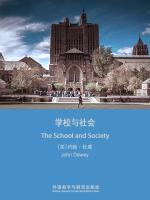School and Society
林瀚轩
"School and Society" is a thought-provoking book that delves
into the complex relationship between educational institutions and the
broader societal context. Authored by renowned education expert John
Doe, this book offers valuable insights into the ways schools shape
individuals, communities, and society as a whole. In this review, we
will examine the key themes and contributions of "School and
Society." The book is divided into three main sections, each
exploring a different aspect of the school-society connection. The first
section, "The Role of Schools in Shaping Individuals,"
discusses the impact of educational institutions on students' personal
development. Doe argues that schools not only provide academic knowledge
but also instill values, socialize students, and prepare them for future
roles in society. "Schools as Community Builders,"highlights
the role of schools in fostering a sense of community within their
immediate surroundings. Doe emphasizes the importance of school
involvement in local initiatives, collaboration with community
organizations, and the promotion of civic engagement among students. In
the final section, "Education and Social Change," Doe examines
the broader societal implications of education. He discusses the
potential of schools to promote social mobility, reduce inequality, and
empower marginalized groups. Doe also explores the challenges faced by
schools in addressing societal issues and offersrecommendations for
overcoming these obstacles. One of the strengths of "School and
Society" is its comprehensive approach to the subject matter. Doe
covers a wide range of topics, including the history of education,
contemporary educational policies, and the role of technology in
schools. This breadth allows readers to gain a holistic understanding of
the complex interactions between schools and society. Another notable
aspect of the book is its emphasis on the transformative potential of
education. Doe argues that schools have the power to shape not only
individual destinies but also the future of society. This optimistic
perspective is inspiring and encourages readers to view education as a
tool for positive change. However, some readers may find the book's
length and density intimidating. Doe's writing style is scholarly, and
the book is packed with research findings, case studies, and theoretical
frameworks. While this depth is valuable for experts in the field, it
may be overwhelming for casual readers or those new to the topic.
"School and Society" is a thought-provoking and informative
exploration of the intricate relationship between educational
institutions and the broader societal context. John Doe's expertise
shines through in his analysis of the various roles schools play in
shaping individuals, communities, and society. While the book's
scholarly approach may be challenging for some readers, its
comprehensive coverage and emphasis on the transformative potential of
education make it a valuable resource for educators, policymakers, and
anyone interested in the intersection of education and society.




 京公网安备 11010802032529号
京公网安备 11010802032529号